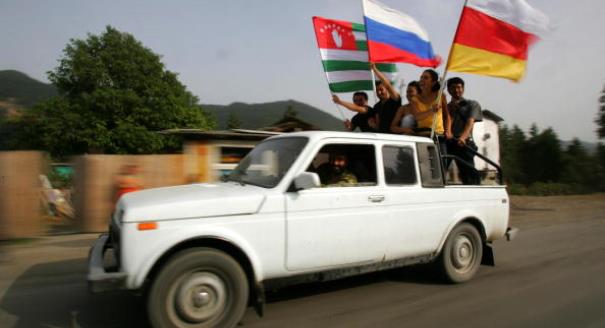When Russian President Vladimir Putin and the president of Georgia’s breakaway region of Abkhazia, Raul Khajimba, signed a Treaty on Alliance and Strategic Partnership on November 24, the accord effectively bound the Abkhaz military and police into Russia’s security apparatus. Under the terms of the treaty, Russia’s border infrastructure will move to the Inguri River—Abkhazia’s boundary with the rest of Georgia. This effectively annexes the province into Russia’s customs and border management space.
The modest, business-like signing ceremony was a far cry from the imperial splendor that heralded Russia’s annexation of Crimea in March. Yet there is little doubt that Moscow sees both Crimea and Abkhazia in a wider context of expanding its regional influence. Russia offers little benefit to its neighbors in Eastern Europe and the South Caucasus but has the power to threaten their very existence as states.
If Russia has its way, the EU’s goal of improving governance in its Eastern neighborhood will be discredited. The EU needs to push back against Russian aggression.
German Chancellor Angela Merkel remarked on November 17 that Russia’s actions in Ukraine, Moldova, and Georgia—and perhaps even the Western Balkans—are dangerous precisely because they are part of Russia’s coordinated strategy of competition with Europe.Merkel’s strong views represent a reversal. After Russia intervened militarily in Georgia in 2008, Berlin disagreed with Estonian, Lithuanian, Polish, and Swedish views that Moscow could pursue the same course elsewhere in the region. After the annexation of Crimea, the German leader has come closer to grasping the real scope of Russia’s moves.
On November 26, the EU’s foreign policy chief, Federica Mogherini, spoke in support of Georgia’s territorial integrity. The governments of some twelve European states, including Germany, made similar statements.
Yet these declarations are insufficient to signal a real change in attitude toward Russia’s actions in its neighborhood. The EU’s sanctions regime remains focused on Russia’s conduct in Ukraine, not elsewhere. The EU needs to widen its focus.
Georgia is the only country in the South Caucasus with an EU association agreement that has a genuine hope of consolidating its democracy. Georgia is also a crucial geographic bridge for channeling energy resources from the Caspian Sea to Turkey and onward to the European market. The country hosts the Baku-Tbilisi-Ceyhan oil pipeline and lies on the route of the planned Trans Adriatic Pipeline. Russian control (or lasting destabilization) of Georgia will eradicate the EU’s foothold in the South Caucasus and hamper Europe’s drive to diversify its energy supplies.
By annexing #Abkhazia, Russia can weaken and manipulate the Georgian government.Tweet This
By moving to annex Abkhazia, Russia can weaken and manipulate the Georgian government. Abkhazia has been the neuralgic point of Georgian politics and a mobilizing force behind the independence movement that succeeded in 1991. Russian encroachment still touches the nerve: tens of thousands rallied in Tbilisi on November 15 to protest against the partnership treaty. EU weakness on this matter will cost Brussels the hearts and minds of Georgians.
Georgians support closer ties with Europe: some 69 percent of those polled in August 2014 favored the country’s European aspirations. Yet in the same poll, 20 percent said Georgia should join the Russian-led Eurasian Economic Union—up from 11 percent in November 2013 and 16 percent in April 2014.
The EU can make an effort to allay these doubts by resisting Russia’s encroachment in Abkhazia more assertively. As the key mediator in international high-level discussions to address the consequences of the 2008 Russo-Georgian War, Mogherini’s office can work with the group’s co-chairs from the UN and the Organization for Security and Cooperation in Europe to call Russia to account.
So far, the EU has been toothless in holding Russia to its own commitments. For example, Russia does not allow the EU’s unarmed monitoring mission in Georgia to enter Abkhazia or South Ossetia, another breakaway region. Moscow has not removed its troops from Georgia, contrary to the terms of the EU-mediated ceasefire that ended the 2008 conflict. Moreover, Moscow refuses to pledge that it won’t use force again.
So far, the EU has been toothless in holding #Russia to its own commitments.Tweet This
Russia also makes a mockery of the international discussions. Russian diplomats say they are invited as observers to the talks between Georgia and its restive provinces. This is patently wrong: the ceasefire was struck by the EU with the Russian and Georgian presidents, the two state parties in the war. Russian diplomats replicate similar tactics of claiming the role of “observers” and “mediators” in the conflict they have instigated in Ukraine.
As the discussion group holds its next round of talks on December 9–10, Mogherini’s special representative should confront Russia on several key matters.
One tangible step would be an EU-led call on Moscow to make a pledge not to use force in the region, especially since Tbilisi made such a unilateral commitment in 2010. Concerted pressure from European capitals to allow human rights observers and the EU monitoring mission into Abkhazia and South Ossetia would show Moscow that the EU is serious about protecting its neighborhood. The question is whether such calls would have any impact.
Georgians made enormous efforts to liberate their country from the post-Soviet plight of corruption, misgovernment, and despair. The current coalition government in Tbilisi is weak and vacillating. But Georgia’s efforts are still worth more than token European recognition. The EU can send a powerful signal by making clear that Russia’s destructive actions throughout Europe’s Eastern neighborhood will be countered diplomatically, not swept under the carpet.








